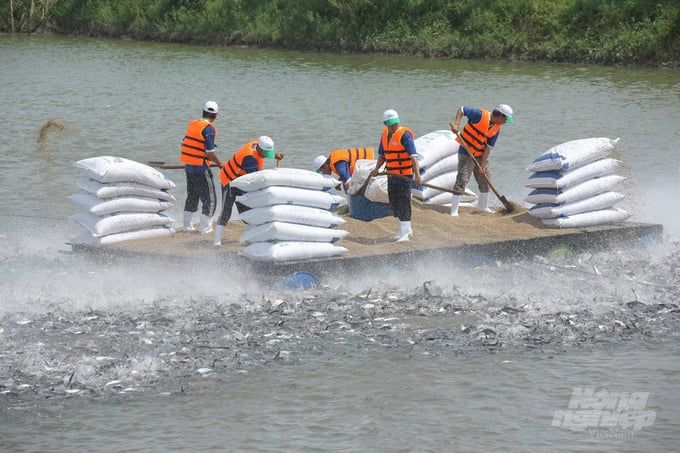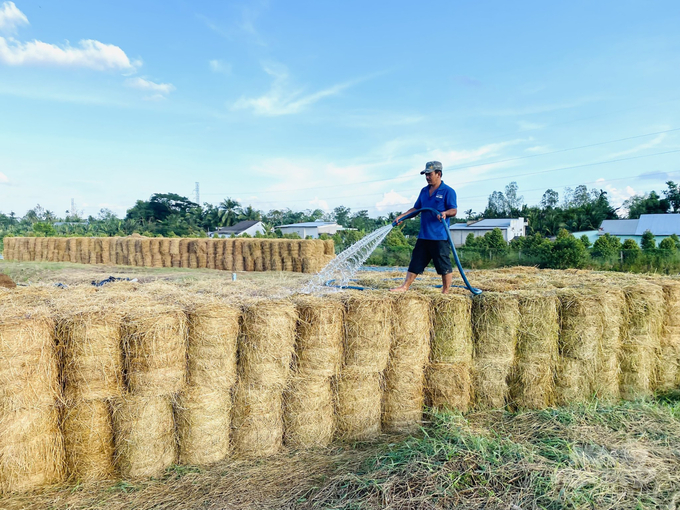May 31, 2025 | 21:16 GMT +7
May 31, 2025 | 21:16 GMT +7
Hotline: 0913.378.918
May 31, 2025 | 21:16 GMT +7
Hotline: 0913.378.918

Vinh Hoan Joint Stock Company (Dong Thap province) is a leading enterprise in processing aquatic by-products into the fish meal - raw materials for animal feed. Photo: Minh Sang.
Dr. Tran Cong Thang, Director of the Institute of Policy and Strategy for Agriculture and Rural Development (MARD), said that agricultural production accounts for 50% of the land area on earth and causes 25 - 30% of total global greenhouse gas emissions. Every year food production consumes 21.3 billion tons of resources.
Agribusiness is responsible for 80% of deforestation, 90% of land degradation, 80% of ecosystem services and biodiversity loss, 70% of freshwater consumption, and more than 80% of polluted water with nitrogen and phosphate, 89% of fisheries are overexploited.
According to FAO, in 2018, more than 156 million tons (about 88%) of the total 179 million tons of fish were used for direct human consumption, while the remaining 12% (about 22 million tons) was used for non-food purposes. Of these, about 18 million tons are processed into fishmeal and fish oil.
In the past, seafood by-products were considered waste, but today are used in the production of animal feed (not only in the form of fishmeal and fish oil) but also as biofuels, science biogas, nutritional products (chitosan), pharmaceuticals (omega-3 oils), natural colorants, cosmetics, substitutes for plastic… 75% of fish oil is used as aquaculture feed.
Forestry by-products are used to make bio pellets for heating and biomass electricity. In addition, wood by-products are also processed into biofuels.
Every year, Vietnam produces a large amount of food to meet the needs of more than 100 million people and exports over US$ 48.6 billion (in 2021) to 180 countries and territories worldwide. The amount of waste by-products discharged in processing agricultural products and food is vast and diverse.
Agricultural by-products are gradually becoming a natural resource, an essential and valuable input for the production of many other fields, creating sustainable, circular agriculture. However, the fact is that Vietnam has not used agricultural by-products effectively, has not created added value, and has reduced negative impacts on the environment from precious resources.
Every year, Vietnam has over 100 million tons of crop residues, including about 45 million tons of dry straw, 8 million tons of rice husks, 30-50 million tons of other plant wastes (peanut, corn, soybean, cassava, sugarcane), coffee…), of which up to 61% are organic and recyclable.
Cultivation by-products, if not managed and used well, will cause waste. According to calculations by agricultural and environmental experts, this lean figure can reach several hundred thousand billion VND per year.
Besides, this amount of by-products is also one of the causes of environmental pollution (soil, air, and water) due to anaerobic burying, indiscriminate discharge, and the burning of crops by farmers.

The green circular economy based on rice is being applied in projects in the Mekong Delta. Photo: Minh Sang.
In 2020, the amount of fertilizer produced by industrial production was 10.23 million tons (7.6 million tons of inorganic fertilizer and 2.63 million tons of organic fertilizer). In addition, there were about 17 million tons of fertilizer. Organic fertilizers are produced by farmers themselves for use from available by-products from cultivation, animal husbandry, and agricultural product processing. In the context of the development of clean agriculture, organic agriculture is an inevitable trend. Using crop residues to produce fertilizers, gradually replacing chemical fertilizers, is still facing many challenges.
90% of seafood processing by-products have been collected and processed into useful and valuable products for feed production, processed into higher value products such as collagen or some instant food... out of a total of about 1 million tons of by-products from the seafood industry.
Our country's seafood by-product processing industry only reached about US$ 275 million in 2020. Still, if the by-products of nearly 1 million tons of the seafood industry are fully exploited with high technologies, it can be obtained from US$ 4-5 billion.
For the forestry industry, each year, Vietnam produces about 30 million m3 of logs, 3.4 million tons of bark, branches, and leaves are discharged, and the processing process has 2.4 million tons of sawdust. These by-products are used for pressing tablets, industrial alcohol, biomass power generation, as a biological buffer for livestock, organic fertilizer, etc. They can develop agricultural, forestry, and fishery production combined with agricultural eco-tourism development.
However, currently, the amount of by-products used to make wood pellets is only about 15%. In contrast, according to experts' forecasts, the world's demand for wood pellets will continue to increase by almost 250% next time. It continues to be an opportunity to promote the development of export wood pellet production.
Translated by Ha Phuc

(VAN) Seafood by-products are opening a new path, combining green growth and technological innovation to enhance the industry's value.

(VAN) Mr. Nguyen Thanh Cong, Vice Chairman of the Son La Provincial People's Committee, reflects on Son La’s journey from barren hills to fruitful orchards after a decade of hard work.

(VAN) FAO’s Director-General addresses the 5th Baghdad International Water Conference.
/2025/05/26/1716-4-nongnghiep-191706.jpg)
(VAN) Chain linkages, technological innovation, and raw material zoning are three strategic pillars for the coconut industry to strongly develop and elevate its position on the global agricultural map.
![Advanced mariculture – an inevitable trend: [4] Accompanied by scientists](https://t.ex-cdn.com/nongnghiepmoitruong.vn/608w/files/sohk/2025/05/13/1941-pgsts-vo-van-nha-140958_717.jpg)
(VAN) According to Assoc. Prof. Dr. Vo Van Nha, Director of the RIA III, the development of advanced offshore mariculture is no longer an option but an essential path for Vietnam’s fisheries sector.

(VAN) Vietnam is intensifying the development of mollusk farming areas that meet international standards, aiming for sustainable growth and enhancing its export position in the global seafood market.
![Advanced mariculture – an inevitable trend: [3] Policy-driven momentum](https://t.ex-cdn.com/nongnghiepmoitruong.vn/608w/files/doanhtq/2025/05/21/0104-0616-0348-nuoi-bien-170339_789.jpg)
(VAN) To ensure the success of offshore mariculture that uses advanced technologies, it is essential to establish supportive policies that inspire both individuals and enterprises to invest with confidence.